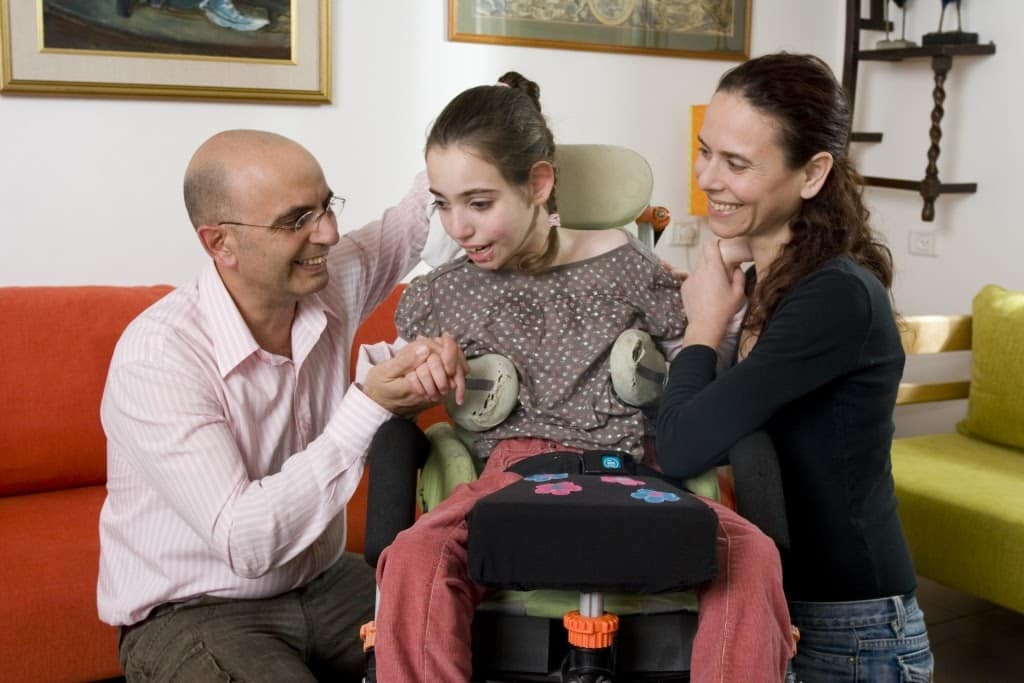
“The paradoxical truth is that a society is strong when it cares for the weak, rich when it cares for the poor, and invulnerable when it takes care of the vulnerable.” (Rabbi Lord Jonathan Sacks)
Background
The birth of a child with disabilities is a life-changing event that has an impact on all those involved: the child, his parents, his siblings, the extended family, and even the community in which the family lives. Caring for children with disabilities, including medical care and rehabilitative therapies, entails the investment of time, physical and mental strength, and high financial costs. The families require a support package that will make it easier for them to care for and raise a child with disabilities.
However, in Israel of 2021, the reality is that these families will still encounter many bureaucratic difficulties, with a multiplicity of service providers facilitating treatments and long waiting periods for the treatments for their children. Not everyone has the patience to go through this, not everyone knows their children’s rights and how to exercise them, and if they are not financially able, they can wait months to receive the diagnoses and treatments that their children need. The situation of the families living in the country’s peripheral communties is even worse due to a lack of doctors and therapists.
Even the reform initiated by the Ministry of Health in 2019 in the field of child development services has not yet brought about the desired change. Since the reform took effect in September 2020, there has been no significant change in waiting times for diagnoses and treatments, and the health funds are finding it challenging to meet the targets set for them by the Ministry of Health. Data released by the Ministry of Health in January 2021 shows that by 2020, a high percentage of patients waited over three months for diagnosis and treatment at all of the health funds. The waiting time for treatments remains too long; in some places, it stands at more than a year, and the shortage of caregivers, especially in the outlying areas, has not been solved.[1]
Even if waiting times for treatment are shortened in the future, there are additional barriers to receiving child development services. Following are just a few of them:
- The responsibility for providing rehabilitative treatments is split between the following: the Ministry of Health, the health funds, various child development units and institutes, the Ministry of Education, the Ministry of Social Affairs and Social Services, private organizations, local municipalities, and private therapists. The State Comptroller stated years ago that the split between those responsible for the provision of therapeutic services is among the factors that make it difficult for children with disabilities and their families to receive optimal therapeutic care and causes real damage.
- Some families are unaware of the rights they are entitled to in child development services, and the יhealth funds and the special education system do not do enough to ensure that all the children exercise their rights.
- The transportation costs involved in bringing the children to their therapy sessions constitute a financial barrier for underserved populations or those who live in the outlying areas, far away from where the therapy is provided.
- Most of the therapy sessions offered by the health funds are during the morning hours, making it difficult for the parents and causing them to miss work. On the other hand, children do not receive all the treatments they are entitled to in the morning, in the special education frameworks.
We call on the State of Israel:
- To unite all the authorities that care for children with disabilities – the health systems, education, welfare, and local authorities – to provide them (the children) with a holistic – diagnostic and therapeutic solution
- To proactively make the information about the rights of families of children with disabilities accessible to all, in all languages; inclusive of families that live in the outlying areas and vulnerable populations and sectors
- To train and recruit rehabilitative therapists of the various fields, especially in the periphery (north and south); to ensure that all children receive the necessary therapies to fully realize their potential within a reasonable time and distance as required by law.
[1] Circular of the Division of Regulation, Digital Health and Computing 3/2019 (2019); Circular for the Supervision of Health Funds and Additional Health Services 7/2020 (2020); The Division of Supervision of Health Funds and Other Health Services, Reform in Child Development – draft publication of average waiting times for the month of 11/2020; (1/2021); Knesset Labor, Welfare and Health Committee Discussion “Reform in Child Development Services – Reporting and Monitoring” (7.12.2020)
